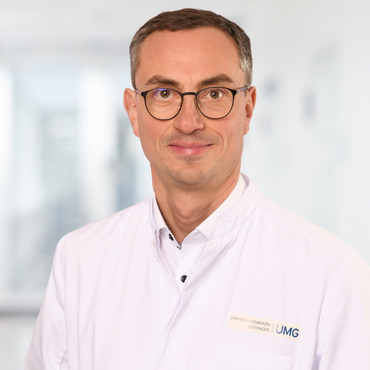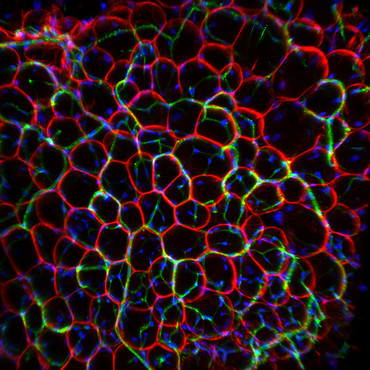Halting Weight Loss in Cancer


(umg) Cancer often leads to malnutrition and weight loss without the affected person being able to prevent it. About half of all cancer patients are affected by loss of adipose tissue and muscle mass, and thus body weight. The result not only negatively impacts their physical condition, but also worsens their prognosis. Researchers led by Prof. Dr. Andreas Fischer, Director of the Institute of Clinical Chemistry at the University Medical Center Göttingen (UMG), have now shown that the cell layer on the inside of the blood vessels, the endothelium, plays a crucial role in the loss of adipose tissue in cancer. The researchers have identified the overactivation of a signaling pathway in the endothelium that is responsible for cell-cell communication of neighboring cells and leads to excessive production of retinoic acid. These events have been identified as key to tissue degradation. The findings of the studies now open up a promising approach for new strategies to halt weight loss in cancer. The results were published in the prestigious journal Nature Cancer in September 2023.
Original Publication: Endothelial Notch1 signalling in white adipose tissue promotes cancer cachexia. Jacqueline Taylor, Leonie Uhl, Iris Moll, Sana Safatul Hasan, Lena Wiedmann, Jakob Morgenstern, Benedetto Daniele Giaimo, Tobias Friedrich, Elisenda Alsina-Sanchis, Francesca De Angelis Rigotti, Ronja Mülfarth, Sarah Kaltenbach, Darius Schenk, Felix Nickel, Thomas Fleming, David Sprinzak, Carolin Mogler, Thomas Korff, Adrian T Billeter, Beat P Müller-Stich, Mauricio Berriel Diaz, Tilman Borggrefe, Stephan Herzig, Maria Rohm, Juan Rodriguez-Vita, Andreas Fischer. Nature Cancer (2023). DOI: 10.1038/s43018-023-00622-y.
Blood Vessels Communicate with Tumours
Blood vessels provide almost every cell in the human body with oxygen and nutrients. However, they are not just passive tubes transporting blood: They control the restoration of tissue and the rejuvenation and differentiation of stem cells. Those cells are part of the regenerative processes in the body, but also play a role in the progress of tumours. Additionally, there is a growing body of evidence leading researchers to believe that signaling pathways of endothelial cells also actively control the transport of nutrients, hormones, and immune- and cancer cells through the vascular wall. Hence, the endothelium is a kind of communications platform that integrates numerous signals from blood- and parenchymal cells to maintain homeostasis – the internal equilibrium of the body.
„My group’s focus lies on researching the signaling pathways that control both the growth of blood vessels and the release of transmitters (angiocrine factors) that in turn control the functions of surrounding cells in normal and cancerous tissues. In our most recent research, my lab has identified the so-called Delta/Notch signal transmission in the endothelium of blood vessels as a key factor in the loss of white adipose tissue. Halting this loss would have a positive impact on the course of cancer therapy“, says Professor Andreas Fischer, Director of the Institute of Clinical Chemistry at the UMG.
ABOUT THE STUDY
Weight loss and malnutrition can play a key role in the course of cancer therapy. The loss of muscle and adipose tissue, also called cachexia, results in a diminished quality of life, worse response to chemotherapy, and increased mortality. Despite this, there is no standardized therapy. Partly responsible for the loss of muscle- and adipose tissue is a restructuring of white adipose tissue, or WAT. This restructuring takes place in an early phase of cachexia and leads to a disrupted fat metabolism, chronic inflammation, and lastly to fibrosis. It is known that tissue loss is the result of so-called factors being excreted by the tumour. The specific factors and what role they play, however, are not yet known. Since the continuous endothelium in white adipose tissue is the first line of contact with circulating factors, UMG researchers have now investigated whether the endothelium itself can control the restructuring of tissues. Using cancer models derived from humans and mice they could show that in the early stages of weight loss, tumours overactivate the Notch1 signal transduction in the distant WAT-endothelium. This signal transmission leads to the excessive production of retinoic acid and the loss of adipose tissue. By blocking the effect of the retinoic acid, the researchers could halt the depletion of adipose tissue in cancer-derived cachexia models in mice. This shows that cancer manipulates the endothelium in distant locations in order to promote the restructuring of adipose tissues. The goal now is to find out, whether these findings, for example blocking the effect of retinoic acid, can be converted into a therapy approach.
FURTHER INFORMATION
University Medical Center Göttingen, University of Göttingen
Institute of Clinical Chemistry
Director: Prof. Dr. Andreas Fischer, Phone +49 551 / 39-63067
andreas.fischer(at)med.uni-goettingen.de, clinchem.umg.eu
University Medical Center Göttingen, University of Göttingen
Göttingen Comprehensive Cancer Center (G-CCC)
Public Relations and Science Communication
Mandy Dall, Phone +49 551 / 39-62152
ccc(at)med.uni-goettingen.de, gccc.umg.eu